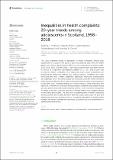Files in this item
Inequalities in health complaints : 20-year trends among adolescents in Scotland, 1998–2018
Item metadata
| dc.contributor.author | Inchley, Joanna C. | |
| dc.contributor.author | Willis, Malachi | |
| dc.contributor.author | Mabelis, Judith | |
| dc.contributor.author | Brown, Judith | |
| dc.contributor.author | Currie, Dorothy B. | |
| dc.date.accessioned | 2023-04-05T10:30:11Z | |
| dc.date.available | 2023-04-05T10:30:11Z | |
| dc.date.issued | 2023-03-20 | |
| dc.identifier | 283995143 | |
| dc.identifier | 6dc996d2-997b-4848-99c8-3eeb6402d678 | |
| dc.identifier | 85152558965 | |
| dc.identifier.citation | Inchley , J C , Willis , M , Mabelis , J , Brown , J & Currie , D B 2023 , ' Inequalities in health complaints : 20-year trends among adolescents in Scotland, 1998–2018 ' , Frontiers in Psychology , vol. 14 , 1095117 . https://doi.org/10.3389/fpsyg.2023.1095117 | en |
| dc.identifier.issn | 1664-1078 | |
| dc.identifier.other | Jisc: 997864 | |
| dc.identifier.other | ORCID: /0000-0001-8322-8817/work/132763895 | |
| dc.identifier.other | ORCID: /0000-0001-7321-9394/work/132764485 | |
| dc.identifier.uri | https://hdl.handle.net/10023/27338 | |
| dc.description | Funding: Funding for the Scottish HBSC Survey was provided by Public Health Scotland (previously, NHS Health Scotland). This work also was supported by the Medical Research Council (MC_UU_00022/1) and the Chief Scientist Office of the Scottish Government Health and Social Care Directorate (SPHSU16). | en |
| dc.description.abstract | This study examined trends in inequalities in health complaints among early adolescents in Scotland from 1998 to 2018. We analysed data from the Health Behaviour in School-aged Children (HBSC) survey conducted in Scotland in 1998, 2002, 2006, 2010, 2014 and 2018. A self-report questionnaire was administered in schools to a nationally representative sample of 11-, 13-, and 15-year-olds (n = 29,250). Health complaints were measured using a scale comprising four psychological symptoms (feeling low, feeling nervous, irritability and sleep difficulties) and four somatic symptoms (headache, backache, stomachache and dizziness). Socio-economic status was measured using the Family Affluence Scale. Between 1998 and 2018, there were significant increases in the proportion of girls and boys reporting feeling low, feeling nervous, sleep difficulties and backache. Prevalence of the eight individual health complaints was higher among girls and adolescents from lower affluence families. Socio-economic inequalities increased over time, such that declines in mental health were greatest among low affluence adolescents. The data show worsening trends in health complaints among Scottish adolescents between 1998 and 2018, particularly for girls and adolescents from low affluence families. Increasing inequalities in mental health highlight the need to address the underlying social and structural determinants of adolescent mental health. | |
| dc.format.extent | 10 | |
| dc.format.extent | 1529912 | |
| dc.language.iso | eng | |
| dc.relation.ispartof | Frontiers in Psychology | en |
| dc.subject | Psychology | en |
| dc.subject | Adolescents | en |
| dc.subject | Mental health | en |
| dc.subject | Health complaints | en |
| dc.subject | Social inequalities | en |
| dc.subject | School survey | en |
| dc.subject | HBSC | en |
| dc.subject | BF Psychology | en |
| dc.subject | RJ101 Child Health. Child health services | en |
| dc.subject | 3rd-DAS | en |
| dc.subject | SDG 3 - Good Health and Well-being | en |
| dc.subject | MCC | en |
| dc.subject.lcc | BF | en |
| dc.subject.lcc | RJ101 | en |
| dc.title | Inequalities in health complaints : 20-year trends among adolescents in Scotland, 1998–2018 | en |
| dc.type | Journal article | en |
| dc.contributor.institution | University of St Andrews. School of Medicine | en |
| dc.contributor.institution | University of St Andrews. Population and Behavioural Science Division | en |
| dc.identifier.doi | 10.3389/fpsyg.2023.1095117 | |
| dc.description.status | Peer reviewed | en |
This item appears in the following Collection(s)
Items in the St Andrews Research Repository are protected by copyright, with all rights reserved, unless otherwise indicated.

